#erwin meta
Note
Lost, I think Erwin was only in 65% of the manga/anime, yet I don't think anyone has ever left such a long-lasting impression on the audience. He ranks higher than the mc in the character polls, and he even once ranked higher than Levi. People still love and praise him even though he's been dead for years. Why do you think this is? What makes him such a compelling character?
I’ve been sitting on this ask for months because it feels like such a huge responsibility to answer it. What is it that makes Erwin Smith such a compelling and enduringly popular character, despite having been written out of the story years ago?
The most obvious reason is that Erwin is a well written character with considerable depth. He is a brave and inspiring military commander who leads from the front and dies heroically, laying down his life to ensure the main characters live to fight another day. He plays a pivotal role in the story and, long after he dies, continues to be a motivating force for several other characters. He’s also pretty easy on the eye, which does no harm either.
However characters like this are ten a penny in manga and anime so I don’t think this is enough to explain Erwin’s enduring appeal. There’s a very interesting interview with Isayama from 2016 where he talks about coming to understand Erwin’s character, which I think gets to the heart of the matter.
“...for Erwin, there’s no person I can easily compare him to…The main reason for that is probably because I didn’t have anyone in my life who was an “insightful leader” like my initial portrayal of Erwin. Of course, I’m sure there were people who were “insightful leaders” to a certain degree around me, but—and this is likely due to a quirk of my own personality—the grander a person, the more my eyes are drawn to the places where they’re frayed, or are coming apart at the seams.
Armin once said of him, “If a person existed who was capable of bringing change, they would have to be able to sacrifice things that are important to them.”
Erwin is certainly someone who can do that, but because I had no one in reality to model him on, and because I, the creator, had no shred of an “insightful leader” within myself to use either, I think I ended up making Erwin more and more human as I went along.
Lately, though, I’ve started enjoying drawing Erwin. To put it simply, I think it’s because I am now able to write Erwin not as the “insightful leader,” but as he is inside my heart, an Erwin who is very complex inside."
And Erwin is a very complex and conflicted character. He’s also a deeply unreliable narrator who sees his own actions in the very worst possible light. He has the ability to motivate others to great feats of heroism, but at the same time he sees himself as a fraud and a conman. He carries a huge burden of guilt over his father’s death, yet he isn’t driven by vengeance, what drives him forward is the pursuit of knowledge and his desire to prove his father’s theories were right. He is a ruthless commander, willing to sacrifice countless soldiers to achieve his goal, but he also devised a Scouting formation that saved numerous lives. He is also quite literally haunted by all the men and women who died under his command. He’s incredibly insightful and intelligent, always thinking several steps ahead of everyone else, but he isn’t invulnerable to being manipulated by unscrupulous characters like Zackley, who was able to spot his weakness. He believes that he alone is pursuing his own selfish dream, despite all the characters having their own dreams and motivations. Yet despite his misgivings, he is able to set aside his dream, and lay down his life for the greater goal of saving humanity. He presents an implacable facade to the world, yet he privately admits to wishing he could end his life. So many deeply human contradictions.
Although Erwin is a hugely compelling character in his own right, I don’t think we can overlook the importance of his relationship with Levi, who of course is the most popular character in the series (sorry Eren). Regardless of whether you ship them or not , it’s impossible to ignore the importance of Erwin’s relationship with Levi (and vice versa). I’ve written reams over the years about Erwin and Levi’s relationship, which I’m not going to repeat here, but I am going to point the famous quote from Ono Diasuke who described Levi as the last stronghold of Erwin’s humanity, because that’s what is really important.
Ultimately Erwin is a complex, contradictory human being and it’s his humanity, rather than his heroism, and the emotional conflict at the heart of his character that continue to fascinates and move people.

71 notes
·
View notes
Text
Armin's Role in Levi's Choice, and the Threat of Erwin's Corruption and Mental Degradation:
Alright, boys and girls, I'm going into this again, because I want to focus specifically on an aspect of Levi's choice in Shinganshina which, sadly, I'm reminded over and over again by people, is widely misunderstood or flatly ignored, and that's both Armin's pivotal role in Levi choosing as he did, and also, Erwin's own impending mental and moral collapse.
People often accuse Levi of letting his personal feelings for Erwin get in the way of making the "right" choice that day in Shinganshina, and they support this claim by making the further claim that Levi hampered humanity's chances for victory by letting Erwin die, Erwin being the great leader that he was, etc, etc... This view is shared, not unironically, I think, by everybody's favorite AoT character, Floch, who we know is a bastion of human empathy and understanding (insert sarcasm here). Because if we should believe anybody about what was really motivating Levi that day, it should be Floch, (insert further sarcasm).
But I say no to these accusations, because they're undeniably refuted by what transpires in the panels of the manga itself.
Now, lets look at these panels, because we're going to analyze and break this down:


Erwin admits to Levi here that seeing what's in Eren's basement, "learning the truth about this world", as he says, is more important to him than humanity's victory. And Levi's response to that is to say "Fine. Erwin, I'll trust your judgment.". Meaning that he's trusting Erwin still to do the right thing, to make the right choice, and should things go south on them, and humanity's victory is compromised by Erwin's judgement-call, then the responsibility for that will be on Erwin and Erwin alone. Levi is both reaffirming his trust in Erwin as a leader, while also acknowledging that Erwin is suddenly, uncharacteristically, threatening to compromise the mission of the Survey Corps for selfish gain. Something which goes against every belief Levi has ever held about Erwin as a leader and a man. Levi's anger and frustration is rooted in that shaking of foundation, in the uncertainty that he now has to confront about Erwin's fitness as a leader.
What's important to remember about Erwin and this moment, is that it isn't the first instance in which he's prioritized his own, personal dream above humanity's victory. He did so as well when he orchestrated the military coup, overthrowing the nobility. Erwin admits this to Zackely, when he confesses that he isn't sure if overthrowing the nobility was really the best move for humanity, and we start to see the first cracks in Erwin's otherwise impenetrable armor.
His insistence, here, that he'll be going on the mission to Shinganshina, is the second instance in which he's placing his own, personal dream above humanity's victory.
Where before Erwin had never once compromised the SC mission for his personal dream, he's now done so twice, in short succession.
Levi, before this, had spoken with Kenny about dreams, and dreams ability to corrupt and compromise us as human beings. And we're seeing that in action here with Erwin. His dream has begun to corrupt him.
But Levi doesn't realize yet how deeply the corruption in Erwin has begun to take root. Hasn't, in fact, yet accepted that corruption in Erwin at all. He's beginning to suspect it, but he still believes in Erwin as a leader. He still trusts his judgment, as he says. He's still deferring to Erwin's judgment over his own instincts.
And Levi won't realize how deep the corruption in Erwin goes, and won't accept it, until the pivotal moment of decision, up on the roof in Shinganshina.
Now let's talk about these panels, because these are vital in understanding what Levi decides next.

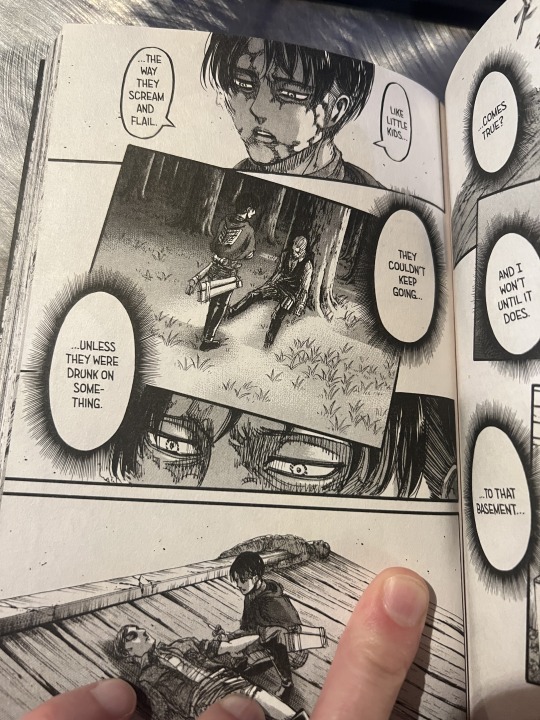
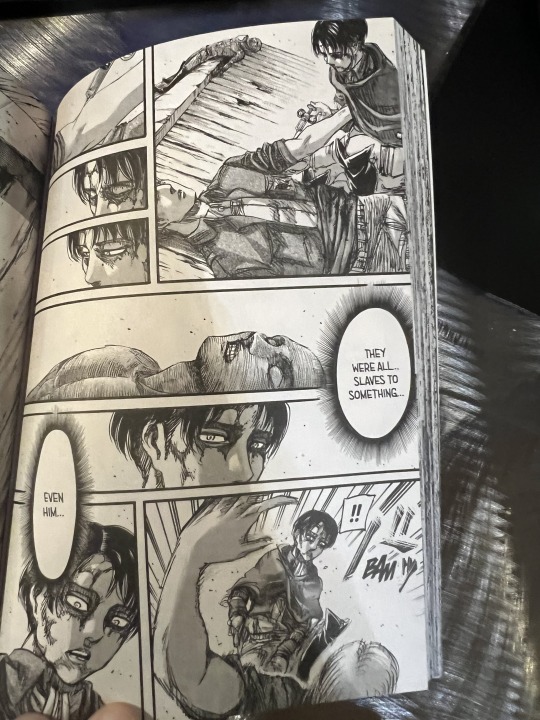

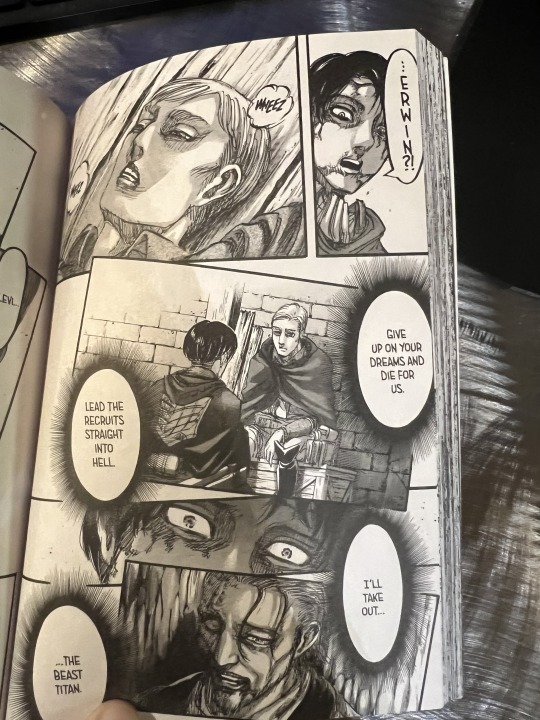
The juxtaposition here of Erwin, Armin and Kenny means everything.
Levi remembers asking Erwin what happens next, once he discovers what's in Eren's basement, and Erwin admits that he doesn't know. All he knows is that he wants desperately to see what's in that basement, and after that, he has no idea. There's no grand plan, no further motivation, no vision for the future of humanity.
Then Levi recalls Kenny's words about dreams, "they couldn't keep going unless they were drunk on something", and this memory is followed by Levi's looking over at Armin's charred body, with Kenny's words ringing in his head "They were all slaves to something. Even him.". We then see Erwin's hand lift up, symbolically smacking the serum away from his arm, and he begins to ramble incoherently, lost in a memory of asking his father how he knows humanity doesn't exist beyond the walls.
It's in THIS moment that Levi realizes that Erwin hasn't been released from the grip of his dream. In his delirious, dying state, it's exposed as the thing that still drives Erwin forward, the thing that still matters to him most. His dream still has him shackled. His dream is still corrupting him.
Again, we've already seen this corruption begin to take root and manifest in Erwin making decisions which directly compromise and endanger humanity's victory, first in orchestrating the military coup, and then in insisting on being in Shinganshina himself.
Levi recalling Kenny's specific words "They were all slaves to something. Even him." is him realizing that Erwin is a slave to his dream. That he can't and won't be able to let it go. He recalls having to order Erwin to do so, to "give up on your dreams and die for us", and then Erwin thanking him for that. He realizes Erwin thanked him because Erwin knew he wouldn't have been able to make that right choice on his own. He realizes that if he hadn't made the choice for Erwin, Erwin wouldn't have been able to give up on his dream. Instead, he would have given in to the corrupting force of his dream, and chosen it over humanity. Just like he did the night before, when he refused to back down from his insistence that he accompany the mission. When he refused Levi's request for him to stay behind.
Levi realizes that Erwin has already been corrupted by his dream. And he realizes that once that dream is realized, Erwin will no longer have anything left to motivate him forward, nothing to be drunk on to keep him from the further degradation and corruption of his mind. He'll no longer be the great leader and visionary he'd once been. He'll be a husk of himself, ruined by the selfishness of his dream, and the guilt he carried as a consequence. Eaten alive by his own demons.
We see this in direct contrast to Armin's burned body, and Levi's memory of his hopeful and innocent eyes from the night before, talking about his own dream of seeing the ocean.
This contrast is majorly important in understanding why Levi ultimately chooses to give the serum to Armin and not Erwin.
Because unlike Erwin, Armin WAS able to give up on his dream and die for humanity. He didn't need anyone to make that choice for him. He made that choice by himself. He willingly sacrificed his life for humanity, and willingly accepted that he would never get to see the ocean, content with the hope that Eren would get to see it in his stead.
Levi realizes, in that moment, that unlike Erwin, Armin hasn't been corrupted by his dream. It wasn't the only thing driving him forward. He wasn't "drunk" on it. He could give up on it for the sake of everyone else. He could sacrifice it.
And that plays a major role in why Levi chose as he did.
It wasn't a case of him prioritizing Erwin over humanity. It was a case of understanding that Erwin's sacrifice, in the end, wasn't self-motivated, and that his dream still controlled him, and would continue to control him, and that truth wouldn't change when he finally realized his dream, but simply leave him bereft, with nothing to shield him from the crushing guilt which had begun to seep in with the realization of his own selfishness, his increasing willingness to prioritize his dream over humanity.
It was a case of Levi realizing that Armin's ability to give up on his dream was also a marker of that's dreams purity, and Armin's own innocence and lack of corruption as a person.
It was a case of Levi realizing that where it was already too late for Erwin to escape that fate Kenny had talked about, it wasn't so for Armin. He reiterates this later on, when he talks about choosing Armin because he "had the same look in his eyes as all of you", meaning his comrades at the beginning of all of it, before they'd been beaten down and ruined by the ugliness of war and dreams.
It was as much that lack of corruption in Armin that made Levi's choice for him, as it was the corruption which had taken root in and begun to eat away at Erwin.
In order for all of their sacrifices to have been worth it, as Levi later says, it would have to have been for an absurdly idealistic world. What that means is, it would have to be for a dream that was pure and without corruption. That's the only thing that would make all of their sacrifices worth it in the end.
And Armin's dream was pure and without corruption.
The very thing they were fighting for was the purity that Levi saw in Armin. Very literally and figuratively, Armin encapsulated the ideal the members of the Survey Corps had given up their lives for. That absurdly idealistic world. A world of freedom and free will and choice.
To choose Erwin would have been a betrayal of that ideal, because Erwin was a slave to his dream. He'd become the very thing the Survey Corps was fighting against. Enslavement.
Armin was a slave to nothing. To choose him was to prove the worth of every fallen soldiers sacrifice. To choose him was to realize the dream they'd all died for.
191 notes
·
View notes
Text
This has probably already been said, but I have to talk about the courtroom scene and why it was a fantastic introduction to not only Levi, but Erwin too—and their relationship.
So we first meet Levi in the heat of battle. We see very quickly the type of fighter he is—confident, but not overly so. He has a strong command of himself and the people under him. He’s The Guy.
Then Erwin shows up and announces they’re pulling back—Levi immediately argues this. We might assume Levi is being set up as the guy who ~doesn’t do well with authority.~ You know the type. He does his own thing. Doesn’t play well with others. Chafes under orders. He’s too big and too important for all of that!

This impression continues when Eren meets Levi and Erwin in the dungeon. Levi is rude and mouthy, and Erwin’s chastisements do little to curb this. Levi’s confidence and skill give him authority issues…right?
So then we move to the courtroom scene, Eren’s trial. Erwin says beforehand that he has a plan, but we’re told nothing more. We see him propose to the court that Eren be given to the Scouts, and he says nothing more.

Levi is the one to scathingly go after the MPs during the debate, pointing out the flaws in their plan and how likely it is that they’re trying to save their own skin. First time viewers might assume that, again, while Erwin is a charismatic leader, he doesn’t go far enough. Levi is the one to say the quiet part out loud, to go to the places Erwin’s too ~respectable~ to go.
Then things start to go sideways. The court’s favor seems to be turning against Eren and the Scouts, fear and paranoia winning out. Eren is getting desperate.
Enter Levi.
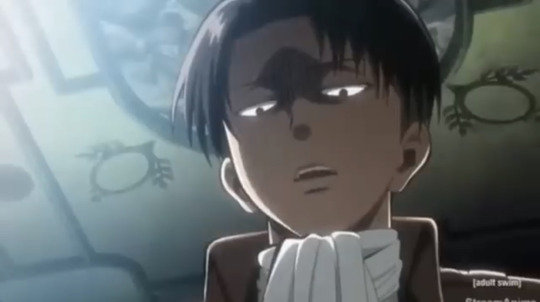
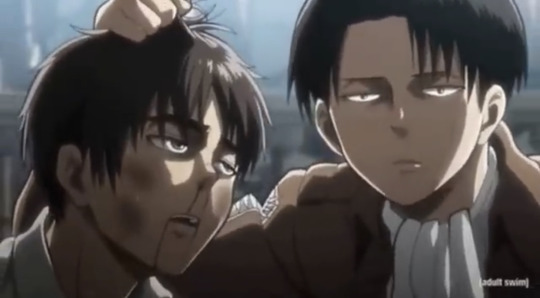
And we get this glorious scene. Levi convinces the court that Eren is harmless to the likes of someone like him. Their best bet is to do what Erwin asked and give Eren to the Scouts. Please.
(Notice how Erwin is not shocked, nor does he try to stop Levi.)
Now again, to a first time viewer, this scene feeds into our preconceived notion of Levi. He’s the guy who isn’t deterred by silly things like rank or authority. He saw that things weren’t going Erwin’s way, so he took matters into his own hands. Maybe Erwin will be mad about this later, but Levi will shrug and roll his eyes and say “but I got results, didn’t I?” and Erwin will have no argument for that.
…Right?
Cut to the next scene, after the court has granted the Scouts custody of Eren—and Erwin’s like, “sooo…sorry about that. We had to make it look good.”
This whole thing was planned by Erwin.
The scene was more or less staged by the Scouts. Erwin wanted to present himself as the calm, collected leader with clean hands. And Levi was the one to do the dirty work, be the brutalizer—even though it was all on Erwin’s orders.
He’ll play that role. He’ll be the rogue, the rough one, the problem child, because his personality fits so well into that niche anyway. But he does it because Erwin wanted him to. If Erwin had wanted him to stand nice and quiet the entire time during the trial, if that’s what needed to be done, Levi would’ve done that instead. He’s not looking to get results; he trusts Erwin’s methods and does what he’s told.
And in this case, he was told to beat up this helpless brat. Gladly.
(How much do you want to bet one of the MPs said to Erwin after, “you need to keep your dog under control.” I would simply implode.)
Like, if this display will land anyone in trouble, it wouldn’t be Erwin—it would be Levi. Levi’s the one who got violent and mouthy during a military trial. He broke rank. He attacked the defendant. Erwin isn’t, ostensibly, responsible for this at all. Levi willingly put himself in that position because he trusted Erwin.
And so everything we thought we knew about Levi is turned on its head! Eren even says so in the next episode—he expresses surprise that Levi’s so diligent about following orders.
Eren, silly boy, assumes that being skilled means you don’t have to take orders from anyone. But Levi does. It’s his whole character. (Notice how, despite him ending up being the oldest member of the Scouts, he’s never in line for Commander? He’s the hands, not the head.)
And this whole thing provides so much insight into Erwin’s character as well! Pyxis says at the beginning of the episode that Erwin is very straight-laced. Well, by the end of the episode, we can see that’s…not quite true.
Erwin is conniving, willing to play dirty, do whatever it takes, to get things to go his way. All while keeping his own hands clean, maintaining the image of the honorable Commander. He simply uses the tools at his disposal (Levi) to do the dirty bits for him.
It’s a fantastic introduction to the Scouts, their leader, and his right hand (or is it the left hand that does the dirty work?)
#attack on titan#shingeki no kyojin#levi ackerman#erwin smith#aot#snk#eruri#i am tagging it that but it doesn’t have to be#mymeta#kylerrambles#this of course is not an indictment of either character i LOVE what this says about them!#it’s good character writing!#there! i made a meta post!#feels good to ramble lol
728 notes
·
View notes
Text
AOT MANGA SPOILERS!
i think what Ymir Fritz was after her whole life (and afterlife) was true love. or at least proof of it.
(read ch122 for her full backstory (which is a masterclass in visual storytelling and storytelling in general) but...)
we don't learn a single thing about Ymir as a person beyond that she seems to long for love from the time she was a child.

also, she more than anyone (in the aot universe) knows endless, merciless suffering. from a very young age she knew the world was cruel.
that’s the reason in my mind that - after getting the power of the Titans - she didn’t rebel against the king. she didn’t run away. she did whatever the king asked of her because for once in her life she was wanted. even in this completely backwards and transactional way, all Ymir knows of love is this, even though it’s just slavery at its core.
so the king got married to her and she had her three daughters, who Ymir doesn't find love in either. it seems her children are more proof of her enslavement. Ymir doesn't even find that true love she wants in her own daughters. she's still miserable.
13 years after she got the power, there’s an attempt on the king’s life, without hesitation she protects him. she, effectively, is willing to face certain death to that end.
so we establish this. to Ymir, love = self-sacrifice.
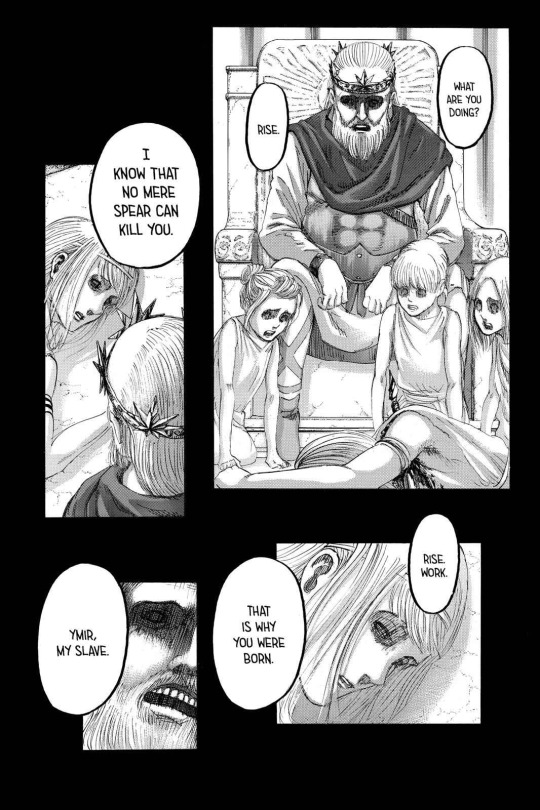
i feel that Ymir finally reaches the end of her ability to "love" the king. this is her breaking point. her final misery among a thousand other miseries she's accepted from him.
she isn't loved. she was willing to give her life, and yet he doesn't love her.
after this rejection, she doesn’t heal herself. we know that in order to use the Titan powers, you have to have a goal (the way Eren learned to transform in The Spoon Incident and later, Reiner doing something similar to Ymir). but she was finished.
Ymir had the power to manufacture a dimension without life or death. the paths. and would spend 2,000 years there doing what she always did and obeying her “king” - the Eldian with the Founding Titan. she wouldn't serve her king directly anymore, but enslavement is Ymir's only definition of love, so that's what she will continue to do.
until she observes a true display of true love.
now (and this is interesting) this is where the concept of the Ackermans come in. i explain in this, this, and this post the Ackermans and the Ackerbond, which is important for understanding this post.
so first, why Mikasa? why would she specifically be the one to free Ymir?
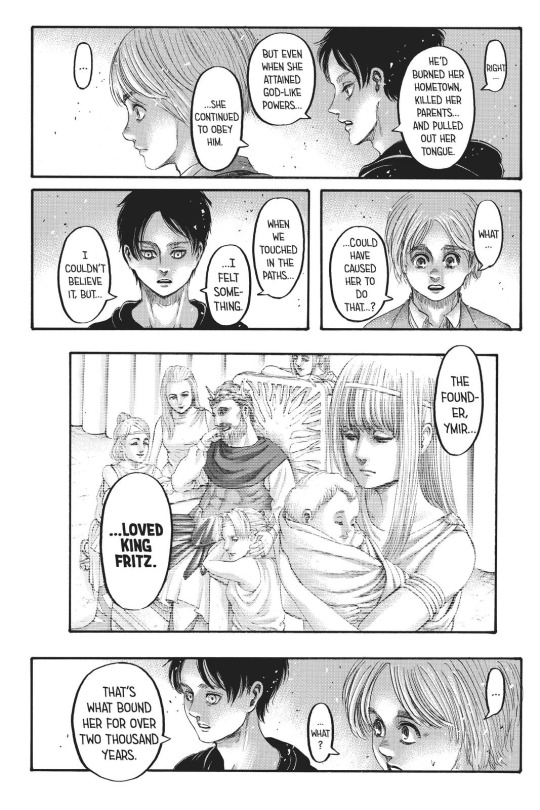
at the time the chapter came out, people criticized Isayama and Eren not knowing how Mikasa was the key the giving Ymir peace. but think about it. Eren doesn't know the depths of Ymir's heart, true. he also got the same exact omnipotence Ymir had thanks to (1) possessing the Founding Titan and (2) effectively having royal blood thanks to the way he enslaved Zeke. Eren has the same exact knowledge that Uri or Frieda had.

but of course, Eren wasn’t BUILT to be god. he has no right to it. Grisha gave him the Founding Titan and he forced Zeke to use his royal blood. Eren says that he started experiencing the past, present, and future all at the same time. of course he wouldn’t know why it’s Mikasa.
what we do know is that the timeline of aot is linear, and can’t be changed. i talk more about that in my Eren character analysis.
the person to ultimately give Ymir peace was going to be Mikasa no matter what. how?
1: being an Ackerman means possessing Titan powers while being a human. would that not also mean that an Ackerman has a special connection to Ymir?
it's different from being a Titan shifter. the potential to awaken their Titan-like powers are their birthright.
2: I linked above my thoughts on the “Ackerbond”. but in a nutshell, Ackermans have the best of both worlds. made to be obedient “Titan-like” tools to protect the king. to be the strongest slaves. while also possessing the best trait of a human being, and that’s the ability to love (as Isayama conveys in aot). so a major trait in Ackermans, i think, is this enhanced ability and propensity to love one special person.
what’s so striking about this from what would be Ymir’s point of view is that, like her, Ackermans have the traits of a Titan like she did, but Ackermans CHOOSE who they are “enslaved” to. it’s not slavery at all. what a shock that must be to someone like Ymir, I mean right?
Levi and Mikasa have their respective moment of “a display of true love” towards their lieges in the series. i want to compare.
Erwin and Levi.
to be succinct, Levi shouldered the weight of Erwin’s sins. [i talk about it more here and in the second half of this post here]. Erwin puts not his life in Levi’s hands, but what comes after. someone putting their trust in their other even in the face of certain death, certain grief, is a major display of true love. (as Isayama conveys in aot that is.)
then, both despite and because of Levi’s love for Erwin, he was strong enough to end his suffering. to let him rest, even though he had the choice to bring him back. that is a major display of true love.
Erwin and Levi both sacrifice aspects of themselves for the other.
what do Levi’s and Mikasa’s moment both have in common?
the willingness to share the weight of their liege’s sins, their darkness, their shortcomings, their most vulnerable sides. that's unconditional love.
But Mikasa’s moment is even more special to Ymir.
Eren’s sins are obviously much more grievous and unforgivable than Erwin’s. that speaks more to how much value Mikasa’s “display of true love” has objectively. and, Mikasa wasn't able to "bring Eren back". (besides obvious plot reasons).
even though it was certain that Eren wasn’t going to be forgiven, that he would have to die, Mikasa’s love never wavered.
both despite and because of Mikasa’s love for Eren, she would be the one strong enough to end his suffering.
Mikasa and Eren both sacrifice aspects of themselves for the other.
Ymir had no one willing or strong enough to end her suffering.
Ymir believes true love is love enduring even in the face of certain grief through mutual sacrifice.
and that’s why she is seen smiling when Mikasa kills Eren. with that, Ymir is finally at peace.

#please reblog this it took so much work🥲#aot spoilers#snk spoilers#eremika#eruri#aot meta#snk manga#ymir fritz#ymir fritz aot#attack on titan meta#attack on titan manga#erwin x levi#eren x mikasa
259 notes
·
View notes
Text
people like to characterize levi as the guarded one, and while that's not an unfair assessment, levi is emotionally guarded, not personally guarded. levi is unflinching in his pursuits, his values, he leaves nothing to the imagination. he's unapologetically himself and regardless of what happens he can't seem to shake his internal drives: his continued belief in fighting for better, in honoring others, in acting in service of things beyond him.
its actually erwin who i feel is the inverse, erwin is clinical, he's constantly crafting, which doesn't negate his sincerity, one of his major components is sincerity, but its an obligatory thing, smth afforded to others. erwin uses service as a mechanism to achieve his actual ideals, whereas levi is driven by service as an outlet for his individualism. however, erwin's passion is what makes him such a good leader. naturally.
eruri are both on the introverted side, hence their symmetry, the onus of externalization and adjustment is eliminated, they're attuned to one another. levi provides certainty and erwin direction. and they both feel safe within that, however, bc erwin had to kill a key part of himself, burying his deviance in order to ascend, he defers to half-truths and obfuscation, its a safety mechanism, the only way attaining power to realize his true passion was possible. the passion we see is only residual, indicative of the flame that truly burns within.
erwin affords only glimpses.
he's paradoxical in that — an at heart withdrawn, observant kid with a fire bright enough to fashion him into the devil. someone subsumed by that which they buried.
he internalizes all the horrors and lets little else color him in the eyes of others bc they have been his persistent norm, he buries his in actuality, juvenile and senseless self, and in doing so, the person he sees as a paragon, the person who the people idealize sees one often framed as cold and unfeeling by others as the truly elevated one, bc in burying his own light, erwin is able to see it in levi.
#eruri#aot meta#erwin x levi#erwin smith#levi ackerman#shingeki no kyojin#aot eruri#snk eruri#levi aot#captain levi#aot erwin#commander erwin#aot#snk
144 notes
·
View notes
Text
Armin’s character and what he represents about bravery within the story means so much to me.
I feel like so often in shonen and general action story media traits like ‘bravery’ and ‘courage’ are considered synonymous with strength or risk-taking- and that’s certainly accurate in a lot of cases. But just like in so many other ways, AOT subverts or critically examines this trope within its characters- particularly in the main trio of the cast.
It’s so easy to reduce Armin to his easiest defined trope- the smart one- and while that’s definitely true and you could write a million meta essays on his intelligence, strategic thinking, etc, I think we don’t talk enough about the ways Armin’s character begs the audience to reexamine what it means to have strength and bravery.
Armin’s strength is not in the physical realm (although it’s worth dedicating another post entirely to the fact that Armin is certainly not that weak either- simply the weakest of an already exceptional group) and his strength is not solely his mind either. But also his determination, conviction, and the way he is willing to sacrifice himself to save others with hardly a second thought- all while not being as rash as Eren and Mikasa can be.
In a recent rewatch of the Trost Arc, there were so many moments that stood out to me that I had previously either taken for granted or not noticed the significance of. In that arc alone, after Eren’s “death” -
He follows Mikasa without hesitation to rescue her when she runs out of gas
Offers Mikasa his gas canisters and blades knowing he won’t survive without them
Defends Eren to the Garrison (this is obviously a pretty big moment that isn’t usually overlooked, of course)
Rushes off from the decoy squad and runs the ENTIRE length of the Trost district wall when he sees the red smoke flair- just to be there to help Mikasa and Eren
Stays by Eren’s titan form on foot in a titan infested area right before he places the boulder
And there’s probably some more I missed.
Armin at this point in the story has no false confidence about his ability to survive- in fact he probably has an abysmal lack of confidence that he can’t affect much, but he does it anyway.
(Obviously, this self-sacrificial tendency reaches a head and ultimately culminates in the sacrifice of his life in the mission to retake Shiganshina…)
All of this to say, what Armin represents about bravery and courage is so important to me because he dedicates his life with the purest of intentions- he is not scared of death in such a noble way and he brings it up again and again. He would die for the cause- nearly does.
Which I think creates an interesting parallel between him and Eren in the sense that Eren is frequently referred to as a “suicidal maniac”- clearly meant to refer to the reckless way he rushes into danger. Whereas Armin’s instinct towards self-sacrifice is never viewed this way, because it’s not a glaring flaw in the same way that Eren’s behavior is.
Another way the story examines this is through his interactions with Annie- who is opposite in that she is fiercely dedicated to her own survival at any cost. This is brought up in their interaction during the ODM gear inspection when she asks him if he would die if someone ordered him to and he easily answered that he would. Armin’s ability to understand this difference between himself and Annie without judging her for it is also unique to him.
Because Armin doesn’t expect anyone else to give their life or view others as cowards for not rushing into danger- because he sees the value in every life. He just feels the cost of his own life would be worth it to preserve someone else’s. It’s this love for humanity and unwavering optimism at the core of his character that gives him so much conviction.
And like so many others have pointed out, this is what saves him (and, to an extent, later the world) in the end when it comes to Levi’s choice to revive him. Erwin was successful because he was able to set aside his humanity and sent countless soldiers to their deaths to gain victory. Armin, more than anyone else in the story, was able to plan and make a difference in such a way that always assumed he would either ask others to take an equal risk or put himself at more risk to reach the goal. And he wasn’t driven by anger, hatred, or rage to do it.
Clearly, there’s a lot that can be said about the way Armin shows strength and bravery in dire situations without being, stereotypically, the strongest character- or even the die-hard risk taking typical protagonist that Eren represents for most of the story.
But I think ultimately the story is trying to show us that Armin’s version is the version that is within reach for everyone- and that will make the biggest difference in not just winning a battle but in making a better world. And it’s so important to me that AOT- despite being such an inherently violent story- took the time to present that message as emphatically as it did.
#armin arlert#eren yeager#annie leonhart#levi ackerman#erwin smith#aot meta#aot analysis#long post#character analysis#this is the result of three days of brainrot rattling my skull#armin is best boy material but like in a viscerally literary way okay?
64 notes
·
View notes
Text
ok just one more thing about color analysis
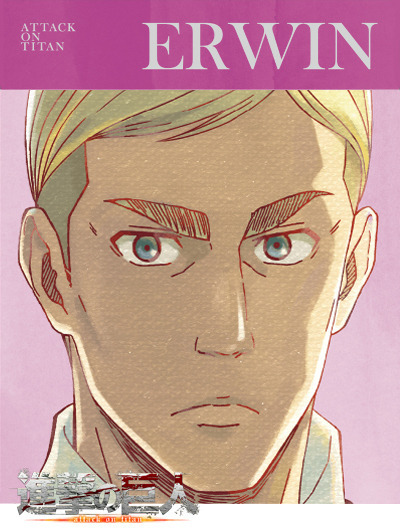
(here is the my full post about the color analysis on other characters including Hange)
This one is specifically about Erwin. What I like about his "official" color is that it's the same as Hange's - purple, mirroring their similar fate of becoming Scouts leader. But there's difference in hue, Hange's looks balanced due to having equal ratio of red and blue whereas Erwin's is magenta and warm-toned due to addition of red. And this addition of red is where the root lies.
Beyond the shared qualities that Erwin and Hange possess and that the color purple symbolizes, such as knowledge, ingenuity, dreams and energy - the very attributes that propelled both into great commanders - the additional touch of red in Erwin's color introduces another layer of connotation to his personality, complementing the classic purple symbolism.
Red symbolizes many things but ones that are relevant to my rant are as follows:
The first and obvious one is bloodshed (cuz blood is also red believe it or not). This connotation ties in with Erwin's treatment of his soldiers and subordinates. Although he cares about them, he doesn't hesitate to sacrifice them for the sake of the mission's success which would often result in lives being lost and blood being spilt.
Going off the blood association, the color red also invokes danger - the feeling that was very evident in each of Erwin's endeavors as his plans would entail endangering the lives of other soldiers.
On the positive note, one of connotations of this color that also pertains to Erwin is passion and driving force. In Erwin's case it mirrors his dream to see what lies beyond the walls, the thing that dictated Erwin's decision.
Another thing worth mentioning is that red is commonly known as the color of revolution - a pretty low hanging fruit for me to point out, considering that Erwin went and did just that in season 3.
All in all, the added hint of red to Erwin's "official" color only underscores the aspects that distinguish him from Hange's approach to leadership. On one hand it's more bloodier and cruel when it comes to soldiers' lives but on the other hand it is more driven and inspiring (not that Hange's isn't it's just their dream doesn't really require an army of soldiers, their dream is more "scientific")
#and this concludes my first and last post about erwin cuz i dont feel qualified enough to talk about him beyond the realm of color symbolism#also erwins been given other colors like blue and gray but shhhh were talking purple only#aot#attack on titan#aot meta#snk#shingeki no kyojin#snk meta#erwin#erwin smith#hange#hange zoe
58 notes
·
View notes
Text
At the start, Erwin is called mankind's hope, and Levi believes this too when he asks Erwin to stay behind instead of going to Shiganshina.
Later, in Levi's inner thoughts, he says he doesn't regret not choosing him. So:
"Erwin, I didn't choose you (Erwin being humanity's hope), and I have no regrets about that. Because I entrusted the future to that kid who had the same look in his eyes as all of you. (Because Armin has what you had)"
Basically: "Erwin, I don't regret not choosing you, even though the situation right now is bad, because I believe that Armin can do what you could have done."
So Levi's choice is actually:
"Erwin, I won't force you to come back; you can rest because I trust Armin is going to be good enough."
19 notes
·
View notes
Text
Since I’m still on my AOT/Eruri kick rn I’ve been thinking how interesting it is that Roy and Erwin are essentially two sides of the same coin.
Roy’s greatest strength and greatest weakness is how much he loves and cares for the individuals in his life, even at the expense of his goals, whereas Erwin’s greatest strength and weakness is how he continually puts his personal feelings aside for the sake of his goals.
The same goes for the relationship with their other halves, Riza and Levi. Levi desperately wants Erwin’s love, but Erwin refuses to compromise his goals and choose Levi over them. Riza continually urges Roy to put his goals first and ignore her, but he cannot, he continues to love her and therefore allows her to remain a weakness for him.
Ughhh both pairings are just so sad and codependent and hopelessly in love no wonder they occupy like 90% of my brain at all times.
#royai#eruri#erwin smith#roy mustang#riza hawkeye#levi ackerman#fma#fmab#fullmetal alchemist#fullmetal alchemist brotherhood#aot#attack on titan#shingeki no kyojin#grace rambles#eruri meta#royai meta
24 notes
·
View notes
Note
Why is the answer always "Levi said this Levi did this" whenever one asks about the signs of Eruri in canon? Levi's side is pretty clear, but every time I talk to an Eruri and I ask "but why do you think Erwin loved Levi" the answer is very long but it's mostly empty and just "I am sure he did" or "but Levi loved him so Eruri is canon". Sorry this isn't a "hehehe your ship is one sided it's not canon" type of question. It's more of a writing-wise question, since you are a writer yourself I thought you'd give the best answer to this.
I am wondering, is this because of lack of Erwin's pov in aot manga or anime? I know Erwin is important and plays an important role and story revolves around him in s3 p2 and all that but when you look at the bigger picture he's mostly just there. He's in the story but you don't see his pov. We don't get to see the inside of his head until the end. Is this why "does Erwin love Levi" question is a hot topic in aot fandom always? Or are there any side stories like smartpass aus that suggest Erwin had feelings for Levi? I'm sorry I don't know those very well I only know the manga and the anime.
Lastly, I am sure you answered this before but my question is very specific, do you actually believe it was mutual? After all it's fiction and you don't need their love to be mutual to ship them. People ship characters who barely interact. It's what fandom is and that's totally normal and valid. I guess I am wondering if you ever doubted, th ship or even yourself which I do a lot (in a "oh I love this so much and I read so much fics I made myself believe" way)
Thanks I hope this doesn't sound rude or offensive, my English isn't very good so if I sound rude that must be it it's not my intention :)
Ooof there’s a lot of different questions here but I think they boil down to the following:
Are Erwin and Levi’s feelings for each other mutual? / Does Erwin reciprocate Levi’s feelings?
Why do people question Erwin’s relationship to Levi?
Do I personally believe their relationship was mutual, and have ever “doubted the ship”?
I’ve answered the first question many, many times over the years. You can read all my various answers here. In short I do think that Erwin reciprocated Levi’s feelings and I think the evidence is there in the manga, the official guidebooks, the Smartpass stories, and the side content for anyone who cares to see it. I’m not going to list all the side content here, but there’s a very old post by @erbeansandravioli that links to a lot of it: Eruri receipts.
As to why people question Erwin’s relationship to Levi, well that’s an interesting one. Some people clearly just don’t get Erwin’s character (see the previous ask I just answered), they don’t understand his role in the plot or the significance of his relationship to Levi. For example I’ve seen people arguing passionately that Levi’s vow had nothing to do with Erwin, which is just mind boggling to me. It’s certainly true that Erwin is a much harder character to read than Levi who very much wears his heart on his sleeve. Erwin is more reserved, and holds his cards closer to his chest. However the fact that Levi is the only one who he reveals his true self to is significant. Daisuke Ono put it beautifully when he said in an interview that the amplitude of Erwin’s feelings is so great that it can be hard to see.
It could also be that some, perhaps younger, readers just don’t recognise their relationship for what it is. It’s certainly not a typical shounen romance, but it is a deeply believable adult relationship; one that is based on mutual trust, respect and understanding. This is from a previous ask I answered on the subject:
It frustrates me enormously when people deny their canon relationship, despite Yams being at paints to explain it repeatedly in the guidebooks. I want to shake them and ask what the hell they think a relationship looks like when you’re an exhausted 30 + year old war veteran who has spent their entire life fighting for survival. It looks like this; finding someone who you can trust with your life. If you were to ask me what characterizes a successful adult relationship I would say it’s exactly this; mutual trust, respect and understanding, and when push comes to shove, the willingness to do everything in your power to help the person you hold most dear, even if that means letting them go.
And as to whether I’ve ever doubted the ship, the answer to that would be no, never. Sure we’ve never seen them swear undying love in canon (though some would argue with that and point to Erwin’s "Arigatō Levi".) I wrote this in response to an ask about Eruri canonicity:
Do you mean that you don’t believe they’re canon because we never see them kiss? Because they never marry? Because the main focus of the story isn’t romance? All those things are true, but in my opinion, they’re also not the only things that make a relationship canon. Particularly when that relationship is between two war-weary 30 year old men who have been fighting for survival almost their entire lives. The irony is that, in some ways, Erwin and Levi’s relationship is actually quite conventional. They really do behave a bit like an old married couple. They have a long standing relationship that has matured over many years, they have their own weird sense of humour, they’re not afraid to challenge each other, but they care about one another deeply, and they also trust each other unconditionally. That’s all the canon evidence I need tbh.
Having said that, you are absolutely right that you don’t need any canon evidence to ship a couple. Hell, I’ve had great fun written Hanji and Petra as a side ship and I don’t think they ever even interacted in canon. In Erwin and Levi’s case though there is more than enough evidence in canon to attest to the significance of their relationship.
Hope this answers your questions.

42 notes
·
View notes
Text
Well, it's the end of an era. I haven't watched the episode yet (I can't find it anywhere rip), but from the small clips I've seen, it looks incredible. Everyone involved put their heart and soul into it and it shows, so thank you for that, truly.
It's really been a journey. AOT was what got me into fandom, and I'm really attached to this series. It's very close to my heart. I'm very much attached to all the characters and the story as a whole, and I'm really gonna miss them. I know, it's always going to be there, but now it's actually over and that's pretty significant. And yeah, I'm on the edge of my seat for the Levi prequel, so at least we have that to look forward to.
But regardless, the journey has come to a close. Thank you for the ride, Isayama, I'll always cherish what you have given us. Thank you to everyone who ever worked on this as well, for all the hard work and effort you put into this series to give us the visual masterpiece that we all fell in love with. And thank you to everyone in the fandom who made the journey so enjoyable and wonderful. Goodbye, AOT.

#SNK#AOT#Attack On Titan#Shingeki No Kyojin#My meta#Levi Ackerman#Eren Yeager#Erwin Smith#I'm so emotional about this man#Really gonna miss this series
20 notes
·
View notes
Text
The Importance of Compassion over Ideology: Levi's Choice as an Act of Mercy and Human Decency
I think one of the most important things that gets lost is all of the discourse, all of the arguing over Levi's choice to let Erwin rest, and whether or not it was the "right" thing to do, is what an incredible act of human compassion, kindness and empathy it was.
One of the main themes of "Attack on Titan" is the danger of ideology and how easily we can lose our humanity to concepts of "the greater good".
All of the arguing within the fandom itself over this particular moment in the story is, in many ways, a manifestation of that. A loss of human compassion, a loss of kindness and mercy to an abstract notion of ideology. Many fans are guilty of just this thing, in their enraged condemnation of Levi's choice. Whether they know it or not, they expose a lack in themselves of human empathy, or even sympathy when they criticize Levi's decision to let Erwin die. To them, the "greater good", that vague, undefined, uncertain promise of something "better" is more important to them than the immediate, concrete and tangible suffering of a fellow human being.
Floch himself is a sort of stand-in for that portion of the audience which so harshly criticizes Levi's choice. And Floch is also an exemplar of what happens, when we place ideology over human compassion. You become a radical extremist, willing to justify any act of atrocity in the name of "the greater good".
Levi is Floch's perfect opposite. His perfect foil. Because we see him make a decision which rejects Floch's brand of justified atrocities, by placing an act of human compassion, kindness and empathy above the vague, undefined and uncertain ideology of the greater good.
And what better person to demonstrate the importance of retaining our humanity in the face of and against ideology, than the most kind, compassionate and empathetic character in the whole series?
Despite what Levi says about himself, about becoming a "monster" that hurts people, his actions belie that self-assessment. Because he not only refused to lose his own humanity to ideology, but also, he refused to let Erwin lose his.
Because ideology, and "the greater good", mean nothing if, in the pursuit of those things, we lose all sense of human decency. If we become monsters. If we lose our compassion, and our empathy toward the suffering of others. If we lose our mercy.
Levi's choice in Shinganshina was really an act of rebellion against the cruelty of ideology; a defiance against the belief of "the greater good" above all else. It was a statement declaring that, no, the greater good doesn't always take precedence, isn't always the most pertinent or important objective. Sometimes, a simple act of mercy is more important. Sometimes, to show compassion toward another human beings suffering is the only path toward an ideal world.
Levi really encapsulate that theme, then, of humanity first, of humaneness first, above the doctrine of movements.
There is no greater good, after all, without compassion and empathy. There is no "better tomorrow" without human kindness.
#Levi Ackerman#Erwin Smith#attack on titan#shingkei no kyojin#meta#commentary#analysis#aot analysis#aot meta
94 notes
·
View notes
Text
What? Levi’s monologue in Ch. 136 AOT
Posting crazy AOT working theories on the art blog b/c I draw so slow.. haha.
Call me a delusional shipper or whatever but.. what if Levi was saying he didn’t regret choosing Armin over Erwin because Armin’s eyes embodies the “sense of idealistic hope and wonder of what’s out there”. Just like survey corps and...just like Hange’s eye(s). ;)

There’s a frame of Levi telling Erwin to give up on his (arguably dead end) dream. One of Armin excitedly talking about his dreams to see the ocean with his friends and a similar scene of Hange excitedly talking among the survey corps.
Armin and Hange take on similar roles in their respective group in those two frames and in the next frames they’re in... their face are similarly filled with sparkly eyes. :D. Erwin is there too with a different face ‘-’.

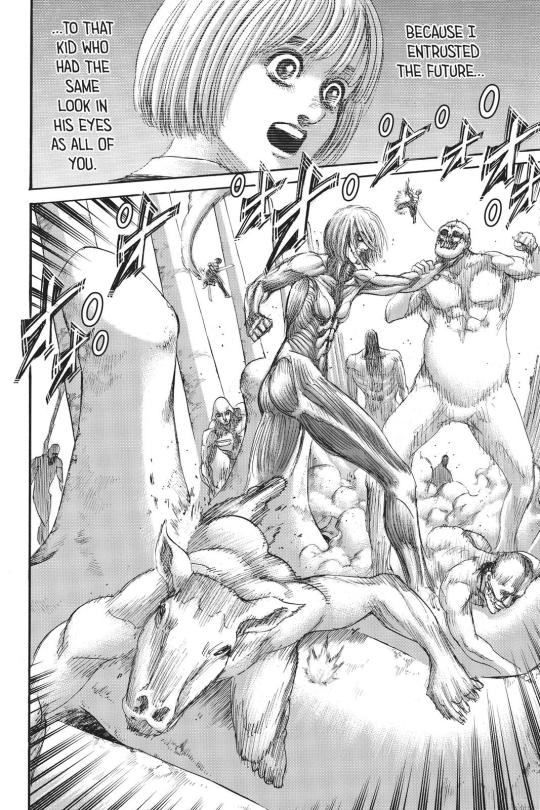
There’s also this scene of when the survey corps visited Marley for the first time.
undefined
youtube
(It’s Levi staring at Hange staring at Survey Corps’ next mission with Armin staring too.)
So perhaps part of Levi’s monologue is about his feelings towards Hange. He grips his sword using the hand he Shinzo Wo Sasageyo Hange with, “I didn’t pick Erwin and I don’t regret it because-

#attack on titan#levi#hange#levihan#aot#meta#snk#shigeki no kyojin#i didn't see this theory anywhere and it makes me lonely?#armin#erwin#136#discuss#Youtube
56 notes
·
View notes
Note
Hi Kane!
I don't know how I can express how amazing & fascinating your post about Levi's mental health is!
Every aspect of it was really interesting, but regarding his relationship issues/shortcomings specifically, how was he able to become close to Farlan & Isabel in your opinion? Their relationship seems crucial to me for the evolution of his interactions with others later on. The fact that, despite all the trauma & issues he experienced, he could form this first bond since his mother's death (and to some extent since Kenny) probably allowed him to build relationships within the Survey Corps.
I'd love to read your thoughts about it (no pressure though, feel free to ignore my rambling)
this isn’t rambling at all!! since you bring it up, i wish i delved deeper into this. i was too focused on kenny (aka levi’s loneliness and suffering)
i'm kind of worried this turned into a bigger analysis of Levi's character more than psychology, but I think I said most of what I wanted to in the original post. This definitely covers how he bonded with his friends -> why they let him continue to bond with others
*sorry this will be quite a bit of speculation seeing how veryyy little we know about Levi, Farlan, and Isabel's history*
(also, i'm going with the manga's version of events because it's more fleshed out)
I'll reiterate this first:
It’s not that Levi feels as detached as he looks, but he doesn’t know how to express himself or open up.
The Underground’s environment also makes him socially awkward, rude, of course stoic/not very expressive, and blunt. Levi was forced to become extremely observant of people to suss out their intentions, remaining vigilant of his surroundings at all times.
Before anything else, it's easy to confirm Levi met and joined up with Farlan before rescuing Isabel off the streets. Because of Farlan, there came about "Levi's" gang (Farlan seems to run it in all the meaningful ways), which necessitated members, and gave Levi/Farlan the means to help the helpless like Isabel (but more on that later).
Farlan and Levi met when Farlan approached him in order to rough him up, and if he was any good at defending himself, he'd have him join his gang. Levi of course cleared all of his attackers, which stunned Farlan. He would do anything to get him to join, even though Levi heavily distrusted him now.
So you would think Farlan doesn't have a chance in the world knowing Levi's history with betrayal.

At some point, Farlan's gang turns on him. Likely because, since Farlan couldn't get Levi to join them, he opted to join Levi and asked the others to do the same.

(I loveee that idea, but that aside) This should speak to what Levi desires more than anything at this point in his life: Kenny really didn't abandon him that long ago, and up to now Levi knows nothing but the suffering of the Underground as far as how the world simply is as a whole.
He is suffering for literally no reason. But, it's not because he was lonely he let Farlan in as much as to have a use for his strength, because in Levi's mind, that's his only use. For many years he's acted "selfish", using his strength only for himself and rotting in hopelessness, so it makes sense to be desperate to break free enough for Levi to (as suggested) cave and let Farlan be his companion in short time. Especially as Farlan gave Levi such a huge amount of "praise"—as Kenny would give Levi—by dropping his own gang and wanting to join with him because of that strength.
Farlan is also much more of a leader, whereas Levi is the opposite, which is true throughout all of canon (not that he can't lead of course). He doesn't plan on the level of Hange nor Erwin, only giving suggestions, and spends the vast majority of the time as a soldier fighting and following orders. So Farlan gave him some stability, even if subconsciously.
Looking through the frame of why Levi chose this bond as—assumably but likely—the first since his mother's death and Kenny's abandonment of him, it's quite immature. Levi didn't need Farlan for any practical reason, and he only seemed to be concerned with survival (not garnering support to reach the Surface). Even though Farlan was untrustworthy, Levi was attached to the need to be needed. Farlan shouldn't have cared for Levi as a person yet, nor showed the goodness Levi would be attracted to, but Farlan did "praise" him, and show he was willing to make an enemy out of his friends to join, so Levi was willing to go with him on that basis.
This certainly speaks to Levi's emotional immaturity, and loneliness.
But he now has some reason to have his strength, which is to protect and support his friend, and with Farlan's proposal about gathering other members, supporting and protecting others.
This leads into Isabel's introduction.
Farlan, before going to the Surface, is frustrated that Levi and Isabel only seem concerned with "dragging everyone else down to where they are" (Isabel who wants to kill, seemingly, the people who have hurt her; Levi is skeptical about Farlan's plan to join the Survey Corps and go Aboveground because it seems to good to be true/could put them all in danger). Farlan is empathetic (Levi wouldn't be with him if he wasn't...), but he's too self-interested to propose rescuing children in order to make them stronger as a group.
So, Levi most likely did make that proposal.

I think that Isabel embodies everything good about the world to Levi. She's so earnest, and pure, and hopeful. There are many moments where Levi looks at her fondly, and when he teases her and she gets upset, he makes sure she knows he was joking.

She embodies what the Scouts believe in too, and she comes to believe in their cause first out of the trio.

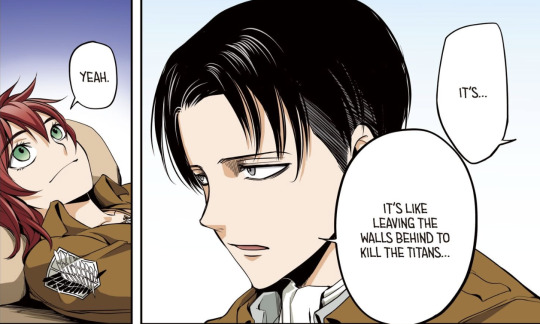
As such, Levi will go to absolutely any length to protect her. The first thing he did after Isabel came back one night after being attacked was track her attackers down and kill them. I wager Levi really does see her as his little sister, like she does her big brother.
All of this taken into account, it makes sense that Levi shot down Farlan's idea of joining the Survey Corps in the beginning, suddenly asked them to find an excuse not to go on the expedition, and killed Isabel's attackers on the spot—Levi is extremely protective of them both. Not only in preserving their lives, but making sure they're living good lives.
But that said about Isabel, Farlan, and Levi's moonlight chat, it goes differently in the manga (although the character and relationship beats are the same). The main conflict of this scene is that Levi keeps defying Farlan, especially as it has to do with Levi's need to kill Erwin (I think Levi feels the same ferocity about this as killing Zeke, which says a lot about Levi's immaturity of the past compared to his righteous anger later.)
Which reflects none of the humanity Levi feels nor his desire to help others. Levi doesn't process it in that way... but he puts aside his pride, and decides to trust Farlan in hopes of living on the Surface with his friends; he won't kill Erwin, at least for the time being.
At this moment, he trusts his friends. On the expedition when he separates from Isabel and Farlan, he trusts himself.

Levi's trust would go on to be broken, but it's remarkably important that Levi doesn't blame himself for Isabel and Farlan's deaths—like he blamed himself for his mother's, and for Kenny's abandonment of him.


Erwin is the reason for Levi's cycle of hopelessness and desolation was broken. (Not to get too far away from psychology, but :')) He gives Levi a common enemy and reasons to fight against it, and for the sake of others.
As when Levi met Farlan, and Levi joining the Survey Corps, it's the same. This means putting his strength (himself) to use, not just for friends, but for the best cause in Levi's mind, because of his friends.
That is, what the Scouts pursue, freedom, is the greatest "goodness" in the world to Levi. Devoting his heart to make a life outside the Walls, so that no one has to live like he had in the Underground, and making others feel safe. The end goal is sickeningly idealistic, but worth the hearts the Scouts give.
Erwin makes Levi realize that for once it's not himself he has to blame. Farlan gets Levi to recognize the importance and what he has to gain from trusting his comrades. Isabel becomes something of an accidental martyr that gives Levi an even bigger reason to join the Scouts in the first place.
It's certainly not the case that Levi connects with his comrades easily, or with many if at all, but Isabel and Farlan's importance is unquestionable in that.
Most pertinently, as one of the central themes of Levi's character, he internalizes trusting his comrades and trusting in himself. (Levi can't know what the right choice is, but nonetheless...)
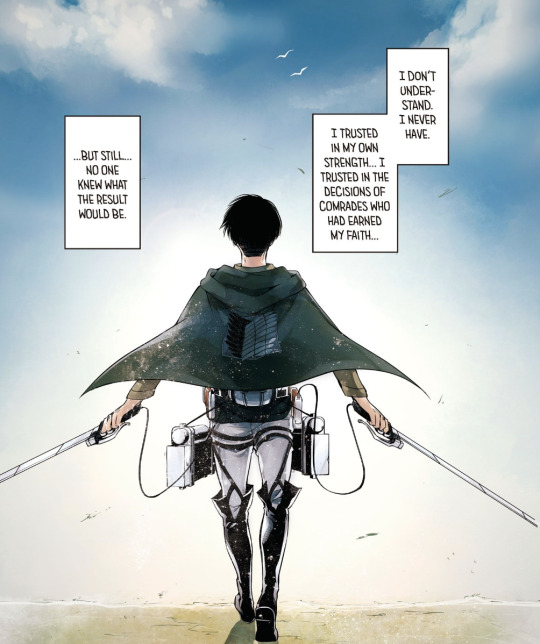
#ps Farlan is also the one that tells Levi to “be nice” and talk to Hange lol. it's a small thing but a big push for levi who'd totally been#separating himself from the scouts emotionally at that point but#had his interest piqued when erwin told him how well he fought and how the others will feel safe w him there#on further reflection levi definitely as a praise kink what the fuck#levi aot#snk levi#levi rivaille#rivaille ackerman#rivaille heichou#captain levi#captain levi ackerman#attack on titan levi#aot levi#levi heichou#levi attack on titan#levi ackerman attack on titan#aot meta#attack on titan
54 notes
·
View notes
Text
eruri & finding peace
of the things i remember recently gaining insight into with eruri, its that they're fundamental reflections of each other, and through this their relationship enabled a resolving of their internal quandaries.
its pretty well known that they're mirror characters (hence their synchronicity), with purpose also informing both their narratives, but they were able to access the truth of their purpose within each other. — erwin was confronted with duty vs drive and the pairs' fight for prominence within him, whereas levi was confronted with self-objectification vs fallibility.
levi idealized erwin as a wholly dedicated person with no personalized conflicts of interest. he saw him as elevated, uninhibited, humanity's paramount heart — a beacon — and was thusly able to dedicate his life in turn, doubly forgiving the loss of his fallen friends in the service of the greater good and the ability to be unflinchingly active in one's pursuits and efforts (i.e dedication/purpose).
erwin, on the other hand neglected a part of his authenticity: both in his ambitions and his responsibilities to humanity. he assumed a relentless resolve which strained the juvenile, personal nature of his wants, and denied him from openly espousing his perspective and ambitions with others, seeking validation/satisfaction through success and output. but, as vindication loomed, he was unable to suppress his truth, with his allegiance to duty distressing him given selfishness opposing his all or nothing/dedication mindset.
levi, while disillusioned, also received a sobering look at his encapsulation of humanity's finest, coming to realize that his romanticization and consequent emulation/endeavoring towards self-objectification was unrealistic, and neglects the fundamental impurities and selfishness which make us human. levi is able to accept erwin in his jejune wants, and places value over his autonomy / rest over service and being a mere tool.
levi has always been one with humanity since his recruitment, with his prioritizing of eren's autonomy wrt turning [early in the show] acting as a key example, however, this is furthered in him humanizing humanity's beacon, displaying an overt and pivotal evolution to his aspirations.
erwin, conversely, is emboldened in the sanctity of his duty. in relinquishing his true humanity/vulnerability to levi and enabling him to be purposeful for the both of them, trusting levi fully in a way reminiscent of the latter's own former idealization, erwin finds true purpose. and so, when levi commands him to make the selfless choice, erwin can die fulfilled, can die with a heart dedicated, having truly ascended above fallibility and into an apex of human will.
thusly, when levi desperately clings to his need for erwin, one now pure and wholly accepting [obfuscating it through utility], it is erwin who emulates levi and allows himself to wholly embrace peace, satisfied truly, and granted purpose even in his rest. and it is levi who relinquishes the toil for the decided heart of another, able to make peace with humanity once more, releasing erwin from the clutches of duty and allowing personhood/self to endure. both united by unfettered humanity.
a man consumed by duty dies at the will of hands and not the machine, and a man consumed by the machine makes an ultimate sacrifice in service of another, and both are granted purpose through fulfilling the other.
#eruri#aot meta#idk#shingeki no kyojin#aot#levi attack on titan#levi aot#aot eruri#snk erwin#erwin x levi#erwin smith#aot erwin#commander erwin#snk#levi ackerman
20 notes
·
View notes
Photo
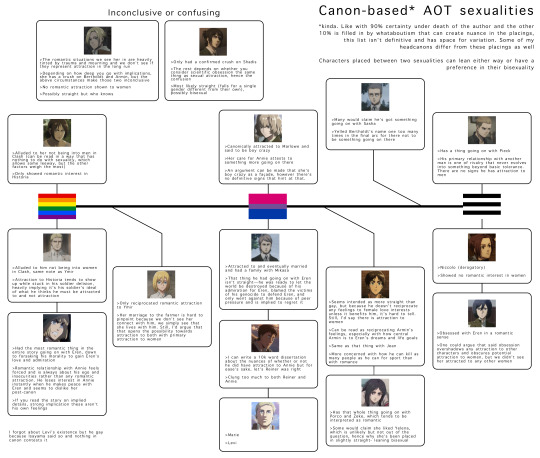
Oh hey, I never posted this here
Last month, I got bored and took a look at the AOT characters’ most likely sexuality in canon, might as well share it on here
Usual disclaimers: Isayama is dead to me and intention doesn’t matter, only depiction does. Some of my headcanons and fanon differ from these as well and just because something’s (probably) canon doesn’t mean anyone’s in any way obligated to follow these. This isn’t meant to contest others’ interpretations and fanon, it was made purely as a fun little bit of trivial meta. Characters between two points can arguably can fall into either side and the side they skew towards is the one that’s most likely. Since not a single character can really be pinpointed with 100% certainty, 90% certainty has become the new reference point for the set sexualities.
#SnK#Shingeki no Kyojin#AoT#Attack on Titan#SnK meta#AoT meta#Annie Leonhardt#Hange Zoë#Hanji Zoë#Ymir#Reiner Braun#Armin Arlert#Levi Ackerman#Historia Reiss#Hitch Dreyse#Jean Kirstein#Bertholdt Hoover#Erwin Smith#Eren Yeager#Pieck Finger#Connie Springer#Porco Galliard#Sasha Braus#Mikasa Ackerman#elidian talk#elidian meta#nonship#spoilerless#safe
66 notes
·
View notes